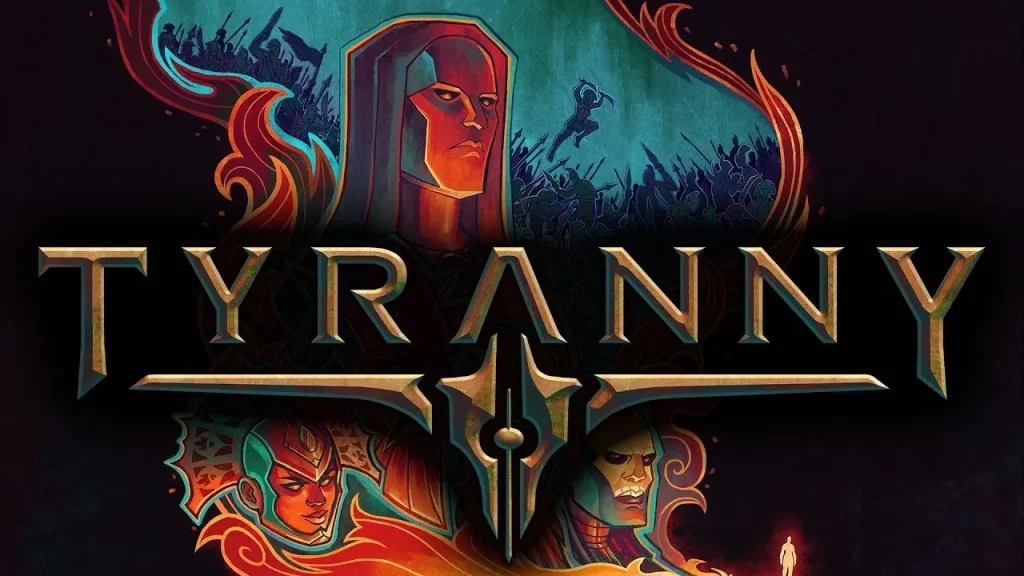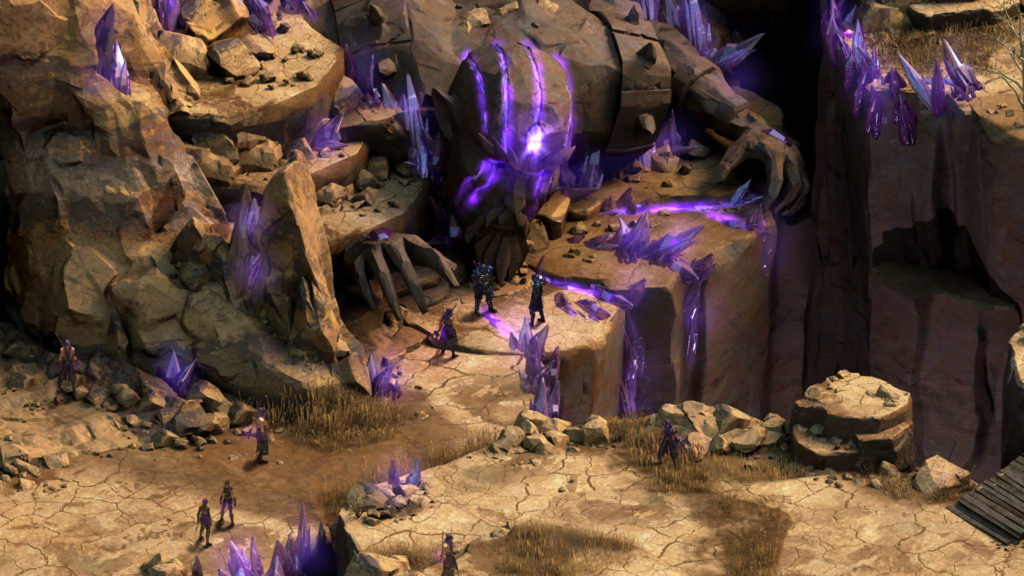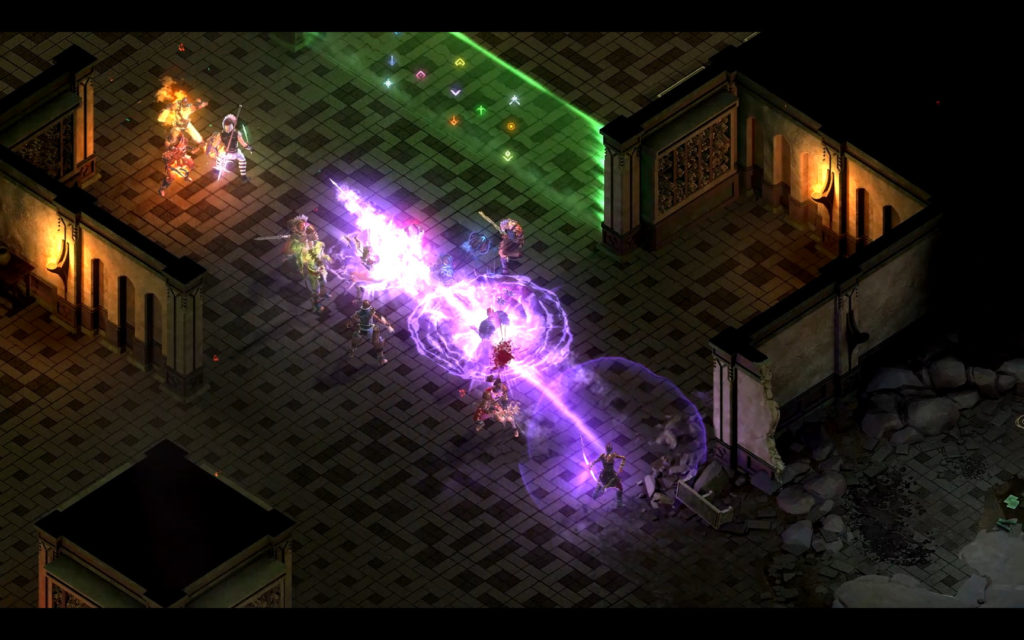Not long ago – it feels like yesterday – I put Tyranny on my New Year’s resolution list. It’s still 2022, right? I’m happy to report that I completed Tyranny. I’m not sure I’m happy that I chose it for my list. It looks unique, and starts out feeling different from other CRPGs, but by the end it feels like a reskin of other games.

Tyranny starts out on a high note – the animated style of the narration and Conquest portion of character creation mesh to give a very different feel from the typical beginning of a CRPG. The backstory (fleshed out in Conquest), in which you are effectively middle management for the conquering despot Kyros, also feels fresh. Not enough games have you start as middle management, assigned to a failing project and expected to turn it around. I’m still left waiting, however, for a CRPG that features a lengthy change control board meeting (where you need to pass a skill check to stay awake).
Conquest deserves a specific highlight, because it’s a sort of adventure game prologue for Tyranny. You pick from a few potential core scenarios, and have to choose among several (usually evil) options. This sets an initial game state where you’ve already had an impact on the world, and are a ranking officer with a history of interacting with several factions in the game. It’s a nice feature that allows for a richer experience later on, and provides some useful context for the game world as well.
Once you’re actually in the game, the newness fades a bit as you get into the nitty-gritty of interacting with the world. The gameplay is exactly what you would expect from a modern, real-time-with-pause CRPG. You’ll spend most of the time exploring or in combat. Thankfully, there is a “fast mode,” since movement is far too slow for the 90% of the time you are not near traps . The rest of your time is spent talking to people.

Like the introductory sequence, the story and characters start out interesting and gradually get less so. Initially everything seems somewhat overwhelming and mysterious. While the factions are typical archetypes, the various mystical beings leading a few of them feel larger-than-life – unknowable beings that have their own strange objectives and plans. By the end of the first act, that illusion is largely shattered. Your first companions are ordered to join you by their masters, and only reluctantly follow your orders, but you can still convince them to stay even after turning on their faction. As the differences between Tyranny and other games fade, the setting starts to feel more and more traditionally “dark fantasy,” just with a few unusual designs.
I can’t help comparing Tyranny to other CRPGs I’ve played in the last decade. Pathfinder: Kingmaker has much more interesting itemization and combat. Torment: Tides of Numenera may be mechanically frustrating, but it at least offers several solid story beats and tells more unusual tales than Tyranny. When the mystique has worn off, the most interesting thing Tyranny offers is more choices and a more reactive world than the standard CRPG. While there’s value in that, I found that I wasn’t as interested in it as I expected to be – very few choices made me think “if I had sided with X, I wonder what would have happened in Y.” Even if I did wonder, I’m more interested in looking it up than plodding through the same looting, dialogue, and combat to get to the story. 15 years ago, I might have been willing to replay a 25-hour game to see what I can do differently; now playing such a game once is a proportionally larger time investment, and if the payoff is “now try doing things differently and look at how the story changes as 80% of the game remains the same,” I’m no longer interested.
While Tyranny gives you a large sandbox to do the standard CRPG stuff, it’s still the same stuff in a larger sandbox. It has the classic CRPG tropes and ends up feeling like a text-heavy, character driven power fantasy that doesn’t say or do anything particularly new. If I had expected that, I would’ve listened to Jay and gone with Disco Elysium instead. While I’d recommend this over Pillars of Eternity, I can’t recommend either to anyone bored of “the usual.”

There are other, subtler disappointments in Tyranny. In an offline single-player RPG you are rewarded daily for logging into your Paradox account. $15 DLC that introduces a separate, isolated subquest location also inexplicably introduces companion sidequests with major developments. It sounds like Tyranny was a sales disappointment – I wonder if the DLC was an attempt to recoup some of the investment. Either way, it’s hard to reconcile these kinds of moves with the “classic CRPG” vibe that Obsidian is going for with Tyranny/POE.
I’ve enjoyed playing CRPGs before. I still enjoy playing some of the classics and I liked what I played of Pathfinder: Kingmaker, but Tyranny isn’t what I am looking for. It felt less like a genuine attempt at creating a fun game, and more like another try at recapturing lightning in a bottle from bygone days. Some of that could be my perspective. Tyranny might be the perfect game for someone who enjoyed Baldur’s Gate 2 or Pillars of Eternity, but I found it too similar to enjoy its full duration.


I like the idea of a game where you play as a midlevel management type who never has full visibility into what your masters’ goals are. You get a portion of the overall picture and perform slightly unclear tasks for some somewhat vague reason. Then at the end it turns out you were Hitler all along. Just kidding, but only that last part.
I feel like there’s a space for games on both ends of the “middle management” equation. You could have minions that perform vaguely assigned tasks (like the RTS Majesty, one of the Romance of the Three Kingdoms games did battles this way too) and the management portion involves optimizing personalities to tasks or making the most of imperfect minions.
Majesty was in retrospect pretty bad (and its mobile port is worse), but in RTK the “indirect command” sometimes had fun results. For example, once I assigned an officer to intercept an enemy attack force, and once he finished them off he took a lightly guarded fort nearby instead of withdrawing like I told him to. It ended up turning a war around in my favor.
In Tyranny, you’re in the middle of the hierarchy (situationally, it depends on context) but you’re getting your hands dirty frequently. It’s kind of like you’re an auditor with a license to kill. It feels a little ridiculous at the end of the game, because you can twist your original mandate into justifying any action you took. Likely one of the points of the game, though.